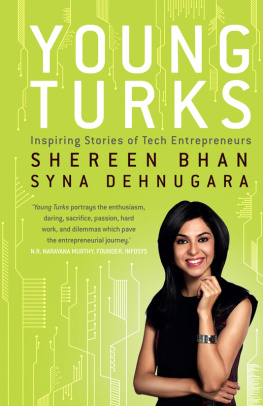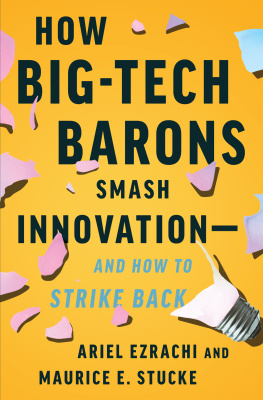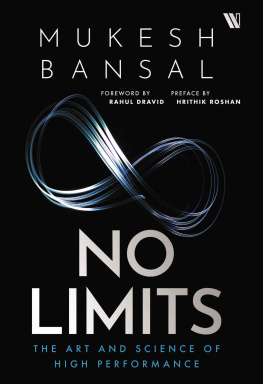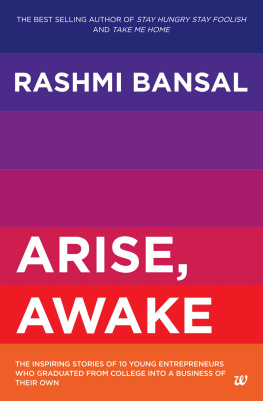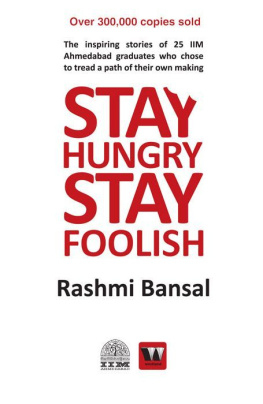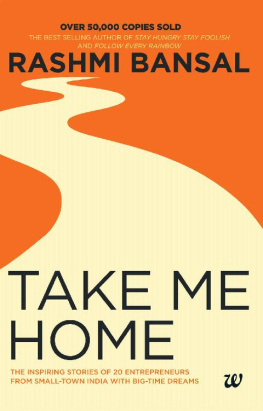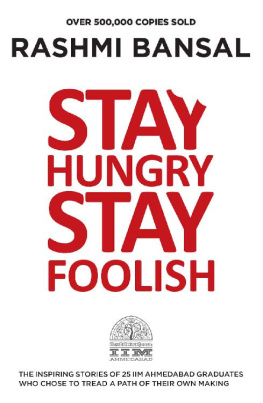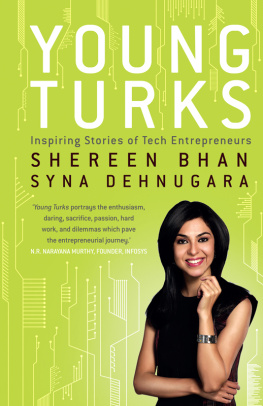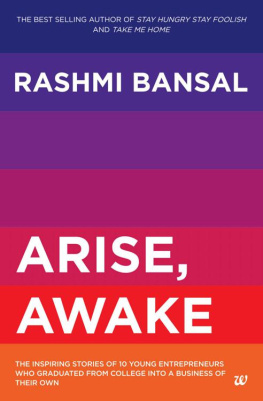Shereen has been the recipient of the Best Business Talk Show award at the News Television Awards for two years consecutively. She also won the FICCI Woman of the Year award for her contribution to the Media in 2005, and was named a Young Global Leader by the World Economic Forum.
Shes been planning a big year of travel for years now and hopes to make 2015 that year with her husband and very own Young Turk in tow.
To those who reinvigorate the past, reposition the present, and reveal the future
Introduction
Over the past thirteen years as the series editor and anchor of Young Turks, Indias longest running show on young entrepreneurs, I have met some awe inspiring individuals. Men and women who have had the courage and tenacity to think differently, think big, and challenge the status quo. Their stories have helped me identify what I believe are the principles of creating profitable, sustainable businesses. The thirteen entrepreneurs featured in this book embody the ideas of entrepreneurship that I believe will stand the test of time.
Someone I respect and admire told me everything is created twice, first in the mind and then in reality. Entrepreneurs are the ones who go through this two-step process of creation. They dont just think or imagine itthey do it. Entrepreneurs are creators of ideas and if executed right, creators of a little bit of magic. From Post- its to the iPhone, entrepreneurs change the way we live through this process of creative destruction. But in a hypercompetitive world where 90 percent of all new products and services fail, making choices is not for the faint of heart, however seasoned. To quote Albus Dumbledore, It is not our abilities but the choices we make that define us. The entrepreneurs in this book shrugged off the odds and as a curious observer of their exhilarating endeavors, Syna and I were determined to unearth the basis of their resilience.
Purpose to Profits: In life and in business we often get caught up in the here and now and forget who we are and what we stand for. Clarity of purpose is the first step towards building a successful, profitable business. Purpose is different from addressing a problem in the market place. It is about defining your core values, your prioritiesyour business chakras, if you will. It is about understanding your vulnerabilities so you can find your strength. The clearer your purpose, higher will the chances of success be. A true leader is always led by a strong belief, understanding, and will. Each and every story in this book illustrates this truth.
It is not lonely at the top; it is lonely at the start: The excitement of starting up is all consuming in the first few months but then reality bites. All thirteen entrepreneurs featured in the book have been brutally honest about the crisis of confidence that often grips a startup in the initial years before success comes calling. It is not easy to be around friends and peers who are climbing up the corporate ladder, while as the founder CEO, you are probably making your 25th visit to the MCD office to get an NOC of some sort. There are moments of doubt as you sit in a room full of potential investors, sweating buckets deciding on how much equity you are willing to part with; and unless you are very lucky, you have given away more than you bargained for. Starting up is an adrenaline rush and a pride swallowing siege at the same time. But you cant stand tall if you are always fitting in; so entrepreneurs need mighty hearts, dogged determination, and a tough gut to roll with the punches.
In God we trust; all others must bring data: The actual quote is attributed to American engineer and statistician W. Edwards Deming but I understood the full force of this thought only through conversations with the founder of Infosys, Mr N.R. Narayana Murthy. He said, guard against business decisions being driven by the founders ego and sometimes delusion. Listen to your gut but back it up with logic and data. Strategy is the subtle life force of a business, driven by courage, anticipation, and sacrifice.
In the chapters ahead you will see these simple but powerful insights being put to use.
Carve a niche; create a category: If you are not first to the market, then create a market. Businesses obsess too much about being better than the competition but perhaps what they should be obsessing about is being different. In your difference, you find your position in the market place. Your position can help determine your value. After all you dont make money making what all can make.
Inside Out-Outside In: An organization must be receptive and responsive. One without the other is no good. As a leader you have to learn to read the clues the marketplace throws up, make sense of them, and use them to adapt your strategy. Necessity may be the mother of invention but, as someone told me, adaptation is the father of innovation. The organization must act as one, aligned towards a single strategy and a clear goal. Being out of sync can often lead to failure.
These and other such principles are the basis for action for the over 2000 entrepreneurs we have interviewed on Young Turks. The thirteen tech entrepreneurs in this book are living proof that entrepreneurship is not an entitlement to be passed from a generation to the next. It is about negotiating life on your own terms. So, let me end with Mark twain, he said that he never let his schooling interfere with his education. I may quite similarly venture to suggest that starting up is for those who never let their business interfere with their entrepreneurship. We also believe that marketing products is not good enough; companies must attempt to create categories and do it through brands.
Before I sign off I would like to thank a long list of people who have made Young Turks possible. My heartfelt gratitude to Syna Dehnugara, my co-author, for being a pillar of support. This book would have been a non-starter without her. I cant thank her enough for her time, patience, perseverance, and passion. I would like to thank the wonderful Young Turks teamShruti Mishra, Megha Vishwanath, Kulbhushan Sharma, and Sauravi Prasai. I would also like to thank colleagues, some current and some former, who worked on the show over the yearsMenaka Doshi, Akanksha Banerji, Anita Balagopalan, Kartik Malhotra, Kunal Chawla, Gautam Shaw, Mallika Menon, Delana Dsouza, and several other video editors and video journalists for working on this show every day and putting up with the insane timelines.

